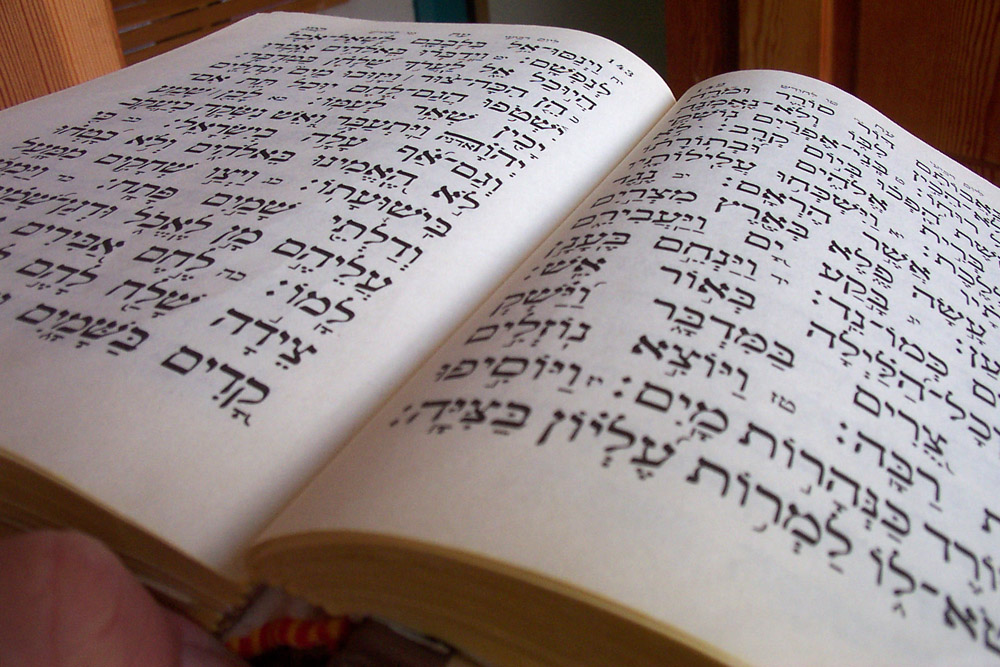The Vort – Emor: The world of the Text, by Alana Vincent
The World of the Text
At first glance, this week’s parsha, filled as it is with laws concerning priests and temple offerings, has very little to say to most of us. But still, here it is, troubling our Saturday morning: ‘Emor. It does follow on quite neatly from last week’s reading of K’doshim–Israel, the kingdom of priests and holy people, has special laws setting it aside from the nations, and the kohanim, the priests of priests, have further laws setting them aside from the rest of Israel. Seems simple, right? Israel is holy as God is holy, and the kohanim are double-plus holy–the ideal, the pinnacle of human existence.
Except that the ideal human apparently can’t be ‘blemished’ (Lev. 21:16-23). And the ideal human can’t marry a woman who isn’t a virgin–which is troubling not even so much for what it says about sexuality, but for what it says about women, who are an accessory to ideal humanity without ever being in the running for it ourselves. We don’t really get to say or do much; we’re mant to just hang around being pure for the sake of the men in our lives (see especially Lev. 21:9–‘When the daughter of a priest defiles herself through harlotry, it is her father whom she defiles’–and that’s the closest the text actually gets to talking to, rather than about, the women in question). These laws are disturbing to our modern sensibilities–sensibilities informed, in no small part, by values we’ve derived from a few millennia of Torah study.
So what do we do?
We could, of course, just ignore the beginning of ‘Emor, skip ahead to chapter 23, which details all the appointed festivals. And while we’re at it, we might as well skip the very end of the parsha, too, about stoning blasphemers, which also puts us into uncomfortable territory. That leaves us with a chapter and a half that safely avoid telling us anything we didn’t already know. It’s familiar. Comforting, even.
The problem here is that Torah isn’t meant to be comforting. ‘Study’ isn’t just repeating stuff you already know over and over again. Torah is challenging, and study–learning–means stepping outside your comfort zone, into the world of the text, and struggling to understand that world on its own terms.
I don’t mean that we should read what Emor has to say about disability as though we were still living back in 500 BCE. Nor should we shuffle it off to the side with a muttered apology about how ‘that was then, this is now’–or a lengthy apologia about how the parsha actually improves the treatment of ‘blemished’ people relative to the time at which it was written (though, please, follow that link because it’s a fantastic commentary on the history of interpretation of this bit of Torah). Both of these statements are true, of course, especially with relation to this parsha. But they’re both statements that help us to disengage, to avoid an argument with the text.
When I sat down to write this, I thought I’d end up saying something very pretty about mishpatim (commandments whose purpose can be logically understood) and chukkim (commandments to which a divine ‘Because I said so, that’s why’ is implicitly affixed), and how we tie ourselves up in knots, sometimes, trying to turn the latter into the former–trying to invent logic where there really isn’t much to be found. But even that seems, now, a bit too much like an easy answer: ‘Oh, the Torah isn’t saying that women aren’t human, or that disabled people are bad.It’s just saying they don’t get to serve God in the same way, because God said so. No point in getting worked up about it.’
This is Torah. We’re supposed to get worked up about it. If the uncomfortable bits of ‘Emor do nothing else, they’re a divine tap on the shoulder: ‘Hey, you. Pay attention! Do you REALLY believe I just said that?’
Sometimes, eventually, ‘No’ is the most honest–and faithful–answer we can give.




APIRKORUS! I love you.
Best article i’ve seen on this site in forever.
And the ideal human can’t marry a woman who isn’t a virgin–which is troubling not even so much for what it says about sexuality, but for what it says about women, who are an accessory to ideal humanity without ever being in the running for it ourselves.
Maybe the kohein gadol isn’t actually supposed to be the ideal human? The Torah portrays Aaron as a deeply flawed character, and the rabbis portray the kohein gadol as so stupid that he needs intensive training to distinguish between sheep and cows.
If only we were all so “deeply flawed” as Aaron.